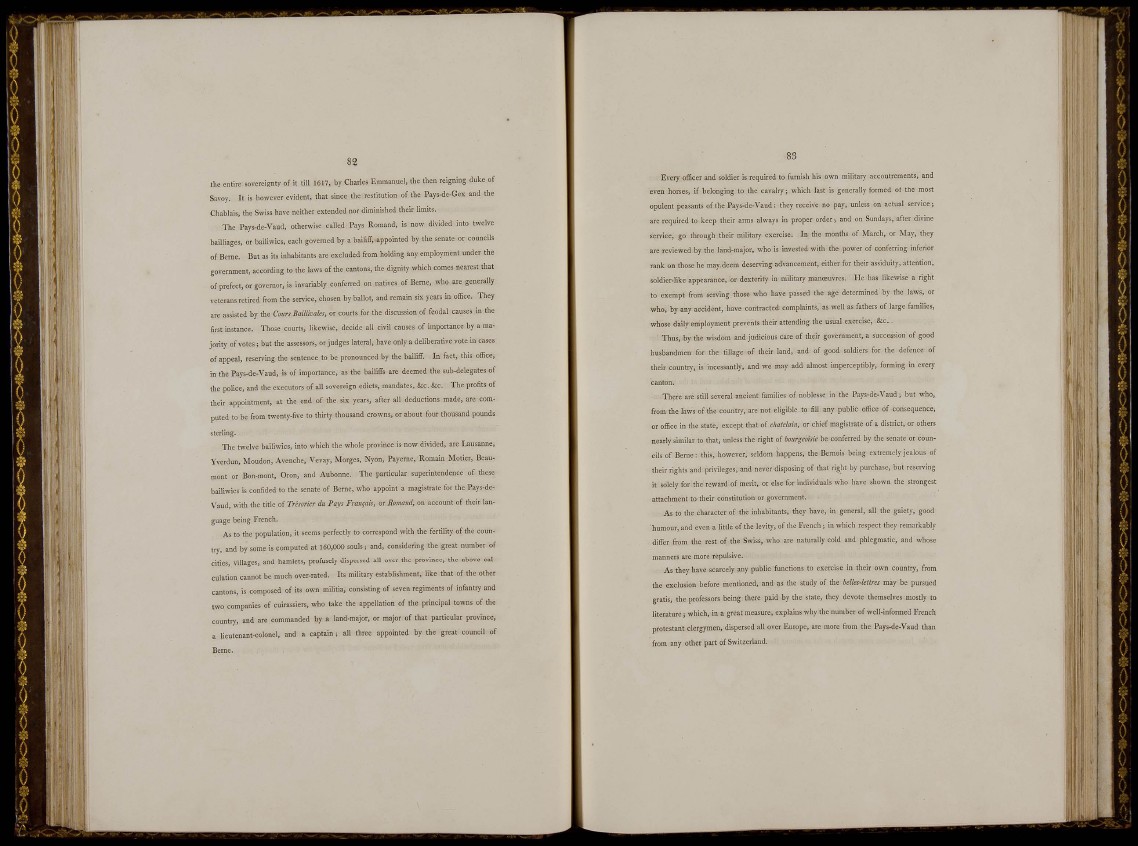
the entire sovereignty of it till 1617, by Charles Emmanuel, the then reigning duke of
Savoy. It is however evident, that since the restitution of the Pays-de-Gex and the
Chablais, the Swiss have neither extended nor diminished their limits.
The Pays-de-Vaud, othenvise called Pays Romand, is now divided into twelve
bailliages, or baiHwics, each governed by a bailiff, appointed by the senate or councUs
of Berne. But as its inhabitants are excluded from holding any employment under the
government, according to the laws of the cantons, the dignity which comes nearest that
of prefect, or governor, is invariably conferred on natives of Berne, who are generally
veterans retired from the service, chosen by ballot, and remain six years in office. Tliey
are assisted by the Cours BaiUivales, or courts for the discussion of feodal causes in the
first instance. Those courts, likewise, decide all civil causes of importance by a majority
of votes; but the assessors, or judges lateral, have only a deliberative vote in cases
of appeal, reserving the sentence to be pronounced by the bailiff. In fact, this office,
in the Pays-de-Vaud, is of importance, as the bailiffs are deemed the sub-delegates of
the police, and the executors of all sovereign edicts, mandates, &C. &;c. The profits of
their appointment, at the end of the six years, after all deductions made, are computed
to be from twenty-five to thirty thousand crowns, or about four thousand pounds
sterling.
The twelve bailiwics, into which the whole province is-now divided, are Lausanne,
Yverdun, Moudon, Avenche, Vevay, Morges, Nyon, Payerne, Romain Motier, Beaumont
or Bon-mont, Oron, and Aubonne. The particular superintendence of these
bailiwics is confided to the senate of Berne, who appoint a magistrate for the Pays-de-
Vaud, with the title of TTÍSOTI€T du Fays Français, or Romand, on account of their language
being French.
As to the population, it seems perfectly to correspond with the fertility of the country,
and by some is computed at 160,000 souls 5 and, considering the great number of
cities, villages, and hamlets, profusely dispersed all over the province, the above calculation
cannot be much over-rated. Its military establishment, like that of the other
cantons, is composed of its own militia, consisting of seven regiments of infantry and
two companies of cuirassiers, who take the appellation of the principal towns of the
country, and are commanded by a land-major, or major of that particular province,
a lieutenant-colonel, and a captain ; all three appointed by the great council of
Berne.
Every officer and soldier is required to furnish his own military accoutrements, and
even horses, if belonging to the cavalry ; which last is generally formed of the most
opulent peasants of the Pays-de-Vaud : they receive no pay, unless on actual service ;
are required to keep their arms always in proper order ; and on Sundays, after divine
service, go through their military exercise. In the months of March, or May, they
are reviewed by tlie land-major, who is invested with the power of conferring inferior
rank on those he may. deem deserving advancement, either for their assiduity, attention,
soldier-like appearance, or dexterity in military manoeuvres. He has likewise a right
to exempt from serving.those who have passed the age determined by the laws, or
who, by any accident, have contracted complaints, as well as fathers of large families,
whose daily employment prevents their attending the usual exercise, Stc..
Thus, by the wisdom and judicious care of their government, a succession of good
husbandmen for the tillage of their land, and of good soldiers for the defence of
their country, is incessantly, and we may add almost imperceptibly, forming in every
canton.
There are still several ancient families of noblesse in the Pays-de-Vaud ; but who,
from the laws of the country, are not eligible to fill any public office of consequence,
or office in the state, except that of cbatelain, or chief magistrate of a district, or others
nearly similar to that, unless the right of bourgeoisie be conferred by the senate or councils
of Berne: this, however, seldom happens, the Bernois being extremely jealous of
their rights and privileges, and never disposing of that right by purchase, but reserving
it solely for the reward of merit, or else for individuals who have shown the strongest
attachment to their constitution or government.
As to the character of the inhabitants, they have, in general, all the gaiety, good
humour, and even a little of the levity, of the French ; in which respect they remarkably
differ from the rest of the Swiss, who are naturally cold and phlegmatic, and whose
manners arc more repulsive.
As they have scarcely any public functions to exercise in their own country, from
the exclusion before mentioned, and as the study of the beUes-lelires may be pursued
gratis, the professors being there paid by the state, they devote themselves mostly to
literature ; which, in a great measure, explains why the number of well-informed French
protestant clergymen, dispersed all over Europe, are more from the Pays-de-Vaud than
from any other part of Switzerland.